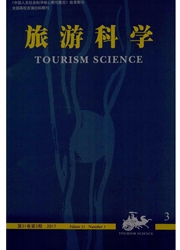

 中文摘要:
中文摘要:
根据山岳风景区短期客流量小样本、非线性等特征,本文提出基于自适应粒子群算法(Adaptive Particle Swarm Optimization,APSO)的支持向量回归(Support Vector Regression,SVR)模型,融合SVR处理小样本、非线性预测特性和APSO优化SVR参数的能力对山岳风景区短期客流量进行预测。来自山岳风景区黄山2008年~2011年暑期相关日数据的验证结果表明:与PSO—SVR、GA—SVR和BPNN等模型相比,APSO。SVR模型的预测准确性更高、误差更小,是进行山岳风景区短期客流量预测的有效工具。
 英文摘要:
英文摘要:
According to small samples and nonlinear characteristic of mountain resorts, the article combines Support Vector Regression with Adaptive Particle Swarm Optimization, which uses superiority of SVR in small samples and nonlinear forecasting and APSO searching for SVR model parameters of optimization, to forecast short-term tourism flow. The daily data set of a 5A mountain resorts from 2008 to 2011 summer holidays in Mount Huangshan is applied as an example. The experimental results demonstrate that the APSO-SVR approach is an effective way to forecast short-term tourism flow with greater accuracy and few errors of all above models including those of PSO-SVR, GA-SVR and BPNN.
 同期刊论文项目
同期刊论文项目
 同项目期刊论文
同项目期刊论文
 期刊信息
期刊信息
